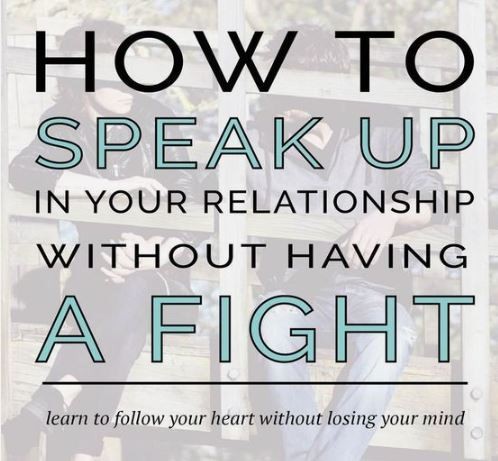The dreaded three words “can we talk,” can immediately stir up defenses. Or maybe those words live on the tip of your tongue, but you just don’t feel like dealing with the spiral downward into the argument abyss, so you never say what is on your heart.
But then, what happens to those concerns, thoughts, worries, and requests that never get said? Do they fester, do you ruminate, do you stuff them? …I am fairly certain they don’t magically disappear. So what are you to do?
At some point, you must speak up. A healthy, happy and lasting relationship requires open communication where you can speak your mind so that these issues do not result in deep resentments that ultimately sabotage your relationship.
So here are some ideas of how to speak up in your relationship without ending up in a fight.
1. EMBRACE AN ATTITUDE OF ABNORMAL IS NORMAL
This one is a mentality shift, and something that may take some time. However, shifting your attitude can be huge in terms of normalizing the need to have conversations about your relationship.
The reality is that relationships are constantly being thrown out of balance. They are regularly in need of attention and adjustments. This is NORMAL.
So, when you need to talk to your partner about an issue, it doesn’t mean that he or she is a bad partner or that your partner is doing a bad job, it means that you are in a NORMAL relationship that requires some maintenance.
Try to talk with your partner about this mentality. Remind him or her at the beginning of a relationship conversation that it is normal to have to make adjustments in how we behave and treat each other.
If you and your partner can get to a place where it is jointly accepted that it is normal to need to talk about your relationship, then these conversations will go more smoothly, and defenses will not be raised at the hint of a “relationship talk.”
2. HAVE REGULAR RELATIONSHIP TALKS
Part of normalizing the need to have talks is to have them regularly, almost like a management meeting. In our couple’s course, Couple LINKS, we refer to this as huddles.
We suggest monthly or even weekly, you and your partner sit down and review your relationship. BTW this isn’t a gripe session…it’s an opportunity to check in with one another. Hit on how things have been going well, and then what needs a bit more attention.
The more you do this, the less likely issues will grow and fester, and the less intimidating these conversations will become.
3. STRIKE WHEN THE IRON IS COLD
So often we hold in issues until they ooze out of us because we can’t contain them anymore. And, more often than not, this happens at the worst times, like when your partner is about to head out of town, or they have an early morning commitment and it’s 10:30 at night.
The tip here is to bring up an issue when things are going well. When you have some downtime together and are in a good place, say something like, “Hey, I’ve been wanting to talk with you about something, you think you’d be up for it?”
Trying to talk about issues when it’s tense, when you’re about to overflow with emotion or frustration, or when time is tight doesn’t go well. So get in there when all is good!
(I wrote a post about Fighting Fair that may also be worth a read….you can check it out here)
4. STICK TO ONE ISSUE AT A TALK
I’m certain this has happened to me. When you begin a relationship talk and suddenly you’re talking about all the issues you have been bottling up, giving examples, and trying to explain everything that has ever bothered you. And then you realize, you’ve lost your point. This is an example of “partner overload.” Seriously, who can hear all those things at once and not feel totally defeated or defensive.
Next time, choose one issue. One point you’d like to discuss and ONLY talk about that point. This will help you to keep it clear and it will also help your partner not to feel like you are attacking from all sides.
5. DON’T GET SUCKED INTO ARGUING EXAMPLES
This is another relationship talk trap. It’s when you start by bringing up one issue and your partner says, “When did I do that?” or “Give me an example.” Ok, so watch your step. It’s totally acceptable to give an example, and even recommendable to have an example already in mind, but don’t get sidetracked into arguing the details of that example.
It’s common for the partner on the defensive to argue that the example given was an exception, not the rule. But, chances are, if you’ve come to the point of needing to talk about something, then it isn’t the exception.
So, handle it like this, “I don’t want to argue every example because I am sure there are reasons for why you did or said _______________. However, when ___________________ happens, I feel upset and want you to know. In the future, I would like _______________ to happen instead.”
Obviously, you may need to customize my suggestion, but the takeaway is to give one or two examples (not more), and then get back to your main issue. Continue to center the conversation on the overarching pattern, because your point is that there is a pattern of x,y,z that upsets you, and you would like your partner to know and make a change. So keep the big picture at the forefront of your conversations.
6. WATCH THE CLOCK
You probably went into the talk with good intentions, but now the talk has dragged on, and you’ve lost any chance of the issue getting resolved. This can happen when the relationship talk just went overboard. It went on way too long.
Work to keep your talks to 30 minutes or less. This can help your partner from glazing over, or things erupting into something bigger. This is important because you don’t want your relationship talks to be so draining that you avoid them in the future. Try to keep any of your negative talks short and to the point.
7. TIP THE SCALES
The final suggestion that I have is to make sure you have significantly more positive than negative talks. Step back and look at the overall mood of your togetherness. Are your negative talks an exception, or do they seem like a bitter seasoning that is sprinkled throughout your time together? Make an intentional increase of your compliments, your expressions of appreciation, and your relaxed and enjoyable conversations so that when you need to bring up an issue, it is with a backdrop of respect and security.


